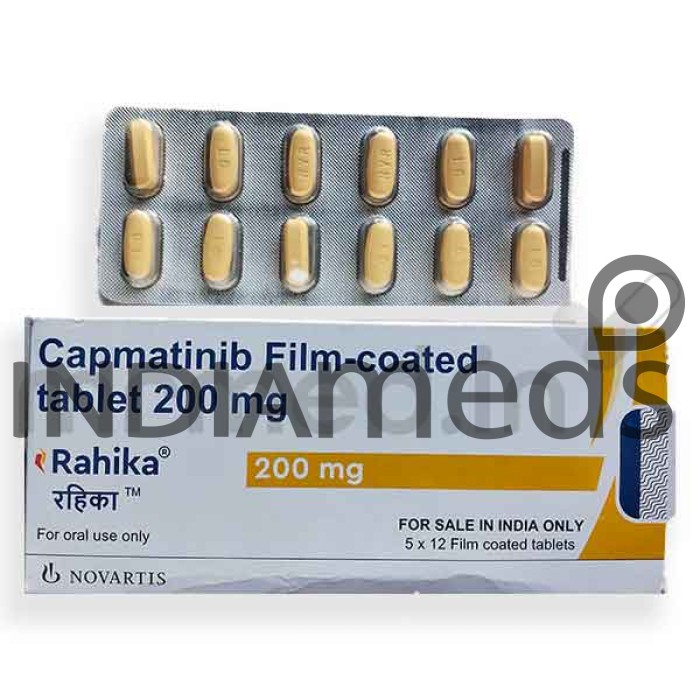Rahika 200mg tablet contains the active ingredient Capmatinib. It is an anti-cancer medicine that belongs to the class of medications called protein kinase inhibitors. It is used to treat adults with a type of lung cancer called non-small cell lung cancer (NSCLC) that has spread to other body parts or is caused by a change (mutation) in a gene that makes an enzyme called MET in adults.
Do not take this medicine if you are allergic to Rahika 200mg tablet or any ingredients. Inform the physician if you have or have ever had lung or breathing problems other than your lung cancer, liver problems, or pancreatic problems. Inform your physician if you have any symptoms of an allergic reaction, including rash, hives, fever, difficulty breathing, or low blood pressure. This medicine is not recommended for children and adolescents below 18 years of age.
Avoid getting pregnant and breastfeeding during the treatment. Use effective contraception to avoid pregnancy. The common side effects of Rahika 200mg tablet are swelling in the face, and body, nausea, tiredness, vomiting, shortness of breath, and decreased appetite.
Therapeutic Effects of Rahika 200mg Tablet
Pregnancy
Do not take Rahika 200mg tablet if you are pregnant because this may harm the unborn baby. Inform your physician if you are pregnant, suspecting, or planning to get pregnant during the treatment. Use effective contraception during the treatment and for 7 days after your last dose.
Breast Feeding
Breastfeeding is not recommended in patients taking Rahika 200mg tablet because the medicine passes into the breast milk in small amounts and may harm your baby. Do not breastfeed during the treatment.
Lungs
Rahika 200mg tablet should be cautiously administered in patients with lung problems other than lung cancer. Inform your physician if you have any lung diseases before initiating the therapy.
Liver
Rahika 200mg tablet should be used cautiously in patients with liver problems. Dose adjustments are necessary for liver failure patients. Inform your physician if you have any liver diseases before initiating the therapy.
Alcohol
It is unknown whether it is safe to consume alcohol with Rahika 200mg tablet. Please consult your doctor.
Driving
It is unknown whether Rahika 200mg tablet alters the ability to drive or operate heavy machinery. If you feel dizzy or sleepy, avoid driving and consult your doctor.
Common
- Swelling in the face, and body
- Decrease in appetite
- Nausea
- Cough
- Fatigue
Serious
- Vomiting
- Liver injury
- Muscle pain
- Shortness of breath
- Lung infection
- Respiratory disease
Inform your physician about all your medical and medication history, including over-the-counter medicines and nutritional or vitamin supplements you are taking.
The duration of your treatment depends on your disease condition and severity. Your doctor will decide your dose, and duration of your treatment.
Yes, Rahika 200mg tablet is safe when prescribed to patients with kidney diseases. No dose adjustments are necessary. Inform your physician if you have any kidney diseases before initiating the treatment.
Yes, Rahika 200mg tablet is a targeted therapy. They work by targeting a mutation in MET gene. This helps slow or stop the spread of cancer cells.
If you overdose on the medicine unintentionally or accidentally, seek medical advice immediately. Do not overdose on the medicine.
Molecule name: Capmatinib | Therapeutic class: Anti-cancer |
Pharmacological class: Protein Kinase Inhibitors | Indications: Non-small cell lung cancer (NSCLC) |









